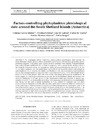Identificador persistente para citar o vincular este elemento:
https://accedacris.ulpgc.es/jspui/handle/10553/72212
| Título: | Factors controlling phytoplankton physiological state around the South Shetland Islands (Antarctica) | Autores/as: | Garcia Muñoz, Cristina Sobrino, Cristina Lubian, Luis M. Garcia, Carlos M. Martinez-Garcia, Sandra Sangrá Inciarte, Pablo |
Clasificación UNESCO: | 2510 Oceanografía | Palabras clave: | Fragilariopsis-Cylindrus Bacillariophyceae Western Bransfield Strait Mixed-Layer Depth Ocean Phytoplankton Phaeocystis-Antarctica, et al. |
Fecha de publicación: | 2014 | Publicación seriada: | Marine Ecology - Progress Series | Resumen: | To investigate factors controlling phytoplankton physiological state around the South Shetland Islands, phytoplankton abundance and structure, fluorescence properties, photo protective pigment composition and physicochemical variables were studied. Nano phyto plank tonic cells (< 20 mu m) contributed 84% of total chlorophyll a (chl a), except for the station closest to the Antarctic Peninsula where microplanktonic cells (> 20 mu m) predominated (up to 85% of total chl a). Daily irradiance over the mixed layer depth (MLD) was inversely related with integrated nanoplanktonic chl a; however, its relative contribution to total chl a increased at mid-irradiance values. The average maximum quantum yield of photosystem II (F-v/F-m) below 20 m depth ranged from 0.17 to 0.53 and showed that cells were under suboptimal physiological conditions in the Drake region, but had higher performance around the South Shetland Islands and towards the Antarctic Peninsula. A reverse pattern in the fluorescence yield was detected. A deeper exa mination of the F-v/F-m vertical profiles according to the sampling time detected surface photoinhibition during the day and a spatial modulation of F-v/F-m related to irradiance and the silicic acid: nitrate ratio. It appears that cells' photosynthetic performance was controlled by iron limitation in the Drake region, whereas irradiance regime controlled phytoplankton physiological state in the rest of the studied regions. Vertical mixing differences among stations, the relative position of the euphotic layer depth with respect to the MLD and the photoprotective pigment ratios revealed contrasting responses to light stress among the different phytoplanktonic groups, revealing a better adaptation of medium size cells, especially diatoms, to stratified waters receiving high irradiance. | URI: | https://accedacris.ulpgc.es/handle/10553/72212 | ISSN: | 0171-8630 | DOI: | 10.3354/meps10616 | Fuente: | Marine Ecology Progress Series [ISSN 0171-8630], v. 498, p. 55-71, (2014) |
| Colección: | Artículos |
Citas SCOPUSTM
12
actualizado el 08-jun-2025
Citas de WEB OF SCIENCETM
Citations
11
actualizado el 01-feb-2026
Visitas
76
actualizado el 11-ene-2026
Descargas
138
actualizado el 11-ene-2026
Google ScholarTM
Verifica
Altmetric
Comparte
Exporta metadatos
Los elementos en ULPGC accedaCRIS están protegidos por derechos de autor con todos los derechos reservados, a menos que se indique lo contrario.
